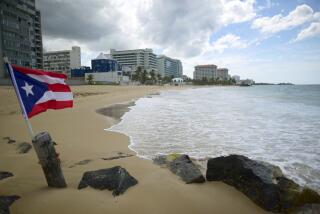A Hand Falls on Hong Kong
- Share via
When Britain handed Hong Kong over to China nearly two years ago, Beijing promised to keep its hands off the territory for 50 years. The Basic Law, a mini-constitution negotiated by the British, guaranteed Hong Kong a “high degree of autonomy” on all domestic matters. China has now broken that pledge. Last weekend its parliament overturned a landmark immigration judgment issued last January by Hong Kong’s highest court. The decision might help ease a potentially disruptive influx of mainland Chinese into Hong Kong, but it also undermined Hong Kong’s rule of law.
Both China and the Hong Kong government have failed this test. China has usurped Hong Kong’s right to interpret the immigration article of its constitution and criticized Hong Kong’s Court of Final Appeal for acting without Beijing’s guidance.
Hong Kong’s Beijing-appointed chief executive, Tung Chee-hwa, acting from purely pragmatic motives, deepened the constitutional crisis by inviting Beijing to review the immigration ruling. Tung was faced with a hard choice. If his government implemented the court’s broad interpretation of the immigration article, the territory, population 6.6 million, could be swamped with as many as 1.6 million new immigrants from the mainland, a figure disputed by many. A narrower interpretation by Beijing would slash the influx of mainland Chinese to about 200,000.
By trying to limit what he called “unplanned population growth,” Tung sacrificed Hong Kong’s judicial autonomy and set a precedent for Beijing’s meddling in any Hong Kong decision-making with which it disagrees. Instead of working with Hong Kong authorities to address the potential immigration problem, Tung rushed to Beijing to seek a solution there. The shipping-magnate-turned-politician displayed a lack of political judgment and a willingness to placate Beijing. By so doing, he has angered the territory’s legal establishment and political opposition and picked a fight at home that he tried to avoid with the mainland.
China will see its interference with Hong Kong backfire. It has given yet another argument to congressional opponents of President Clinton’s policy of engagement with China. Perhaps even more important, it is diminishing the hope for peaceful unification with Taiwan. Although Taipei has never accepted Beijing’s “one country, two systems” accommodation with Hong Kong, it considers China’s scrupulous compliance with the Basic Law a prerequisite to unification. That prospect has been damaged.
More to Read
Sign up for Essential California
The most important California stories and recommendations in your inbox every morning.
You may occasionally receive promotional content from the Los Angeles Times.













